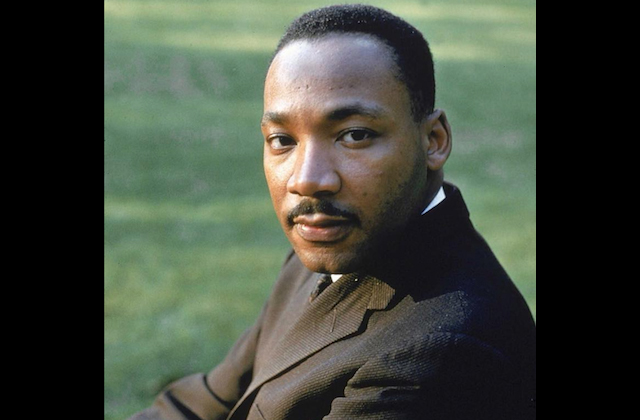In the latest attempt to soften the radical works and words of Dr. Martin Luther King Jr., Dodge used one of King’s sermons in a commercial during Super Bowl LII yesterday (February 4). The use of King’s words to sell cars prompted immediate criticism.
The Associated Press reports today (February 5) that the advertisement, which you can see below, sets part of one of his sermons over footage of a firefighter removing a child from a burning car, someone passing out turkeys to neighbors in pouring rain and other "people doing service-oriented tasks."
Vox reports that the clip uses segments from "The Drum Major Instinct," which The King Insitute at Stanford University notes was delivered on February 4, 1968 (exactly 50 years before the Super Bowl). The sermon takes its name from a previous speech by Methodist preacher J. Wallace Hamilton, which King used as inspiration. The title draws an analogy between drummers leading parades and humans’ innate, selfish desire to be recognized while leading something. The excerpt used by Dodge, as transcribed below, touches on King’s invitation for his followers to lead because of love and service, rather than ego:
If you want to be important, wonderful. If you want to be recognized, wonderful. If you want to be great, wonderful. But recognize that he who is greatest among you shall be your servant. That’s a new definition of greatness. … By giving that definition of greatness, it means that everybody can be great. … You don’t have to know about Plato and Aristotle to serve. You don’t have to know the theory of relativity to serve. You don’t have to know the second theory of thermodynamics in physics to serve. You only need a heart full of grace, a soul generated by love.
The ad overlooks other sections of the speech, in which King critiques how advertisers capitalize on the "drum major instinct" to push people into consumerism that hurts their economic potential:
Now the presence of this instinct explains why we are so often taken by advertisers. You know, those gentlemen of massive verbal persuasion. And they have a way of saying things to you that kind of gets you into buying. In order to be a man of distinction, you must drink this whiskey. In order to make your neighbors envious, you must drive this type of car. In order to be lovely, to love, you must wear this kind of lipstick or this kind of perfume. And you know, before you know it, you’re just buying that stuff.
[…]
You know, economists tell us that your automobile should not cost more than half of your annual income. So if you make an income of five thousand dollars, your car shouldn’t cost more than about twenty-five hundred. That’s just good economics. And if it’s a family of two, and both members of the family make ten thousand dollars, they would have to make out with one car. That would be good economics, although it’s often inconvenient. But so often, haven’t you seen people making five thousand dollars a year and driving a car that costs six thousand? And they wonder why their ends never meet. … I am sad to say that the nation in which we live is the supreme culprit. And I’m going to continue to say it to America.
Vox notes that one critical reaction to Dodge’s excerpt choice came from Nathan Robinson, editor-in-chief of Current Affairs, who replaced Dodge’s audio with some of the critical portions above for a satirical ad on YouTube. That video now appears with a message saying that it was removed "due to a copyright claim by Chrystler," the partent company of Dodge.
The King Center in Atlanta, a memorial center and archive founded by Coretta Scott King, tweeted that neither it nor King’s daughter Berenice King approved this use of King’s words to sell cars:
Neither @TheKingCenter nor @BerniceKing is the entity that approves the use of #MLK’s words or imagery for use in merchandise, entertainment (movies, music, artwork, etc.) or advertisement, including tonight’s @Dodge #SuperBowl commercial.
— The King Center (@TheKingCenter) February 5, 2018
Many denounced the advertisement and the hypocritcal use of King’s words during a football game when National Football League players like Colin Kaepernick were harshly criticized themselves for protesting against racism:
The King family has vehemently defended MLK’s likeness, voice, speeches, etc. FOR DECADES. To hear him now… on an ad… to sell… trucks…. is unsettling.
AF.
— April (@ReignOfApril) February 5, 2018
Ordinarily I wouldn’t mention the Dodge Ram’s Super Bowl Ad because I wouldn’t want to draw attention to it, but exploitation of Martin Luther King Jr.’s speech about servant leadership to sell trucks is a new low.
— Rep. Keith Ellison (@keithellison) February 5, 2018
In the US, Martin Luther King Jr can be used to sell cars, but not to inspire you to use non-violent protest. #Kaepernick #SuperBowl
— Hari Kondabolu (@harikondabolu) February 5, 2018
Despite the rejection from The King Center, Slate reports that the King estate, which is not connected to the nonprofit organization, did approve the commercial.
Listen to "The Drum Major Instinct" in full below.
